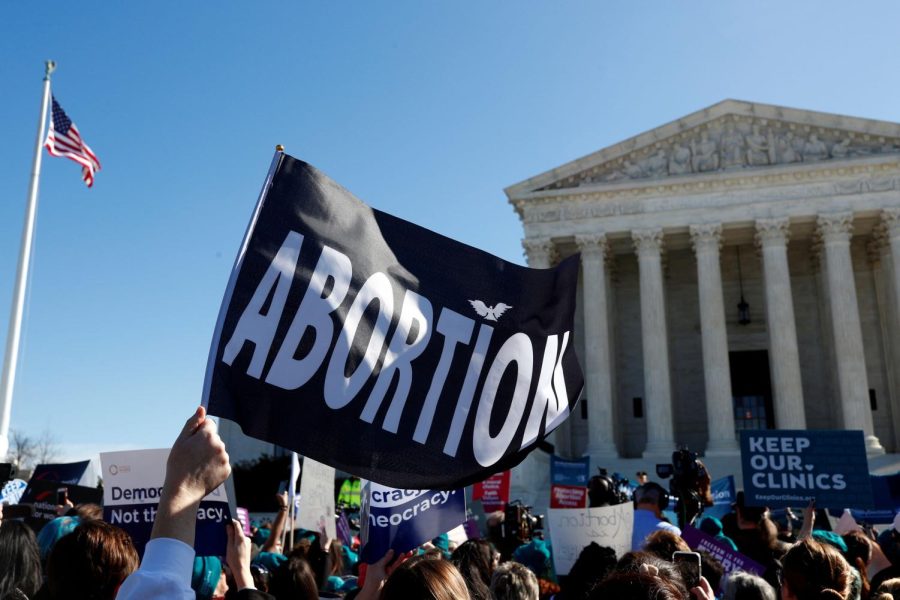Supreme Court Set to Decide Mississippi Abortion Case
On December 1st in the case of Dobbs V. Jackson Women’s Health Organization, the Supreme Court heard the first oral arguments, with a decision expected sometime in June. The Mississippi law was passed in March of 2018 and banned abortion after 15 weeks unless it was life threatening or the fetus had severe abnormalities. The law, however, has no exceptions for pregnancies from incest or rape. After the law was passed, it immediately was challenged by the only clinic left in Mississippi, the Jackson Women’s Health Organization. This is because of Mississippi’s hostile environment for abortion doctors and workers, and because the state has tried at every chance they had to pass laws to make abortion clinics harder to operate. The law has been blocked since November of 2018, but the appeals process has brought it all the way up to the Supreme Court. Up until this point the Supreme Court has maintained the position that abortions before viability(around 24 weeks) are allowed, saying States may regulate abortion procedures as long as they do not impose an undue burden on the woman’s right, but depending on the ruling this decision could overrule Roe V. Wade and Planned Parenthood V. Casey.
Roe V. Wade was a landmark decision in 1973 that gave women in the U.S. an absolute right to abortions in the first three months with limited rights in the 2nd 3 months. The 1992 case of Planned Parenthood V. Casey ruled that states could not place an undue burden on women seeking abortions before a fetus could survive outside the women, around 28 weeks during the Roe V. Wade era, and around 23 weeks now with the medical advancements. These decisions have remained fairly unchallenged in the time since, but with a new supreme court makeup, things could change. After Donald Trump’s 3 Supreme Court nominations, the court is now 6-3 conservative to liberal, the first time since the 1930’s, even though the Supreme Court is not supposed to be a political body.
So What Exactly Happened in the Hearing on December 1st?
Mississippi Solicitor General Scott Stewart told the courts that these past rulings, “haunt our country,” and, “poison the law,” and then relayed how the current viability standards are not tied to the constitution in any way(Aren’t the majority of our modern laws not tied to the constitution?) Justice Sonia Sotomayer, appointed under Obama, was the most vocal in support of abortion rights throughout the hearing, warning that the court could be damaged if it is thought of as a political body. Justice Elena Kegel agreed with this, saying she does not want the court to be thought of as something that goes back and forth on rulings depending on what part of the public yells the loudest. Sotomayer also signaled that she believed the motive for the Mississippi law was religious, and therefore should not be brought into government for the separation of church and state. Chief Justice John Roberts suggested that the court could reverse a significant part of Roe V. Wade but preserve some constitutional right to abortion. His questions showed that he is considering getting rid of the viability line, 23 weeks, but still protecting abortion after a certain point like 15 weeks. In order to do this he would need to get other justices on board, but the other conservative justices seem more in favor of completely overturning Roe. Gorsuch and Kavanaugh, both appointed by Donald Trump, seem ready to overturn the case. Clarence Thomas, as a strict constitutionalist, vigorously challenged the validity of Roe. Both Barrett and Alito are less clear on what they are thinking in terms of the ruling, with the possibility of them upholding the Mississippi law, but deciding Roe at a later date.
Chief Justice John Roberts, as a lawyer for the Reagan and Bush administrations, has directly opposed Roe V. Wade, but as a justice on the Supreme Court he has been extremely cautious. As one of the closest to the center justices, he has tried to keep it from lurching too far to the right. He, like Sotomayer, worries that public trust in the court could collapse if they overturn such a controversial case, especially less than 50 years after it was originally passed.
My Thoughts
As you can tell from the article, I really am not a fan of the Supreme Court overturning Roe V. Wade. First of all, the vast majority of the public supports it, with a recent poll showing that only 24% of Americans support overturning Roe V Wade(although the numbers have been as high as 40 and as low as 20 in other polls). Secondly, recent statistics show that almost half of women who get abortions are below the U.S. poverty line, and another 25% percent of the women are considered low income. This means that if these women are denied abortions, they will have to raise a child with limited funds, most likely pushing them further into poverty. Additionally, a 2018 research article from the American Journal of Public Health found that women who were denied abortions were more likely to live in poverty after four years, less likely to have a full time job, and more reliant on public assistance than women who received abortions. One more thing I have grievance with is Justice Barrett’s comments that the overturning of Roe V Wade would not force women into motherhood because of Safe Haven laws, in which a mother can give up their child to designated safe havens with no questions asked and no charges filed. First of all, the limit for safe haven laws is usually very short, sometimes less than a week. Second of all, the foster care and adoption systems in most states are already severely strained and very traumatic to the kids in it, does America really want a massive influx in that population? On a legal basis, I think Justice Elena Kagan sums it up the best, “usually there needs to be a strong justification in a case like this, beyond the fact that you think the case is wrong,” the justice said, “Not much has changed since Roe and Casey. The reason people agree or not are the same reasons they’ve always had… aren’t we in the exact same place except we’ve had 50 years of women relying on this right?”
https://www.marketwatch.com/story/nearly-half-of-women-who-have-abortions-live-below-in-the-federal-poverty-level-2019-05-17
https://www.theguardian.com/us-news/2021/dec/01/five-takeaways-us-supreme-court-mississippi-abortion-rights
https://abc7ny.com/amy-coney-barrett-adoption-supreme-court-abortion-law-mississippi/11303046/
https://www.usatoday.com/story/life/parenting/2019/09/13/safe-haven-laws-things-you-didnt-know-surrendering-newborn/2031516001/








